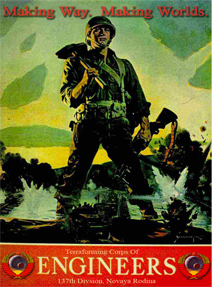Meadow
Called Novaya Rodina (New Motherland) by its Russian inhabitants in defiance of the post-War rename by the Celestine Cartographical Nomenclature Uniformity Act of Parliament of 2511, Meadow was terraformed and settled in the early years after the Exodus. The 'Verse offered people from Earth That Was a unique opportunity to claim entire worlds for the exclusive use of individual cultures or people. As the superpowers from the Pre-Exodus days colonized the two biggest worlds in the Core in an echo of the geopolitical situation on ETW, the lesser powers--smaller but no less important in the mass Exodus effort--also laid claim to a world or two as befitting their role as back-up players in the Exodus enterprise. The Russians, being a superpower in their own corner of Earth That Was and accustomed to sovereign autonomy, left the Core to terraform a New Russia as soon as it was possible to do so.
The Russians, however, were hampered by their cultural tendency to more authoritarian rule and a talent for getting stuck with the not-quite-right, and even though they settled their world and it was as remote as they wished, the terraforming wasn't as successful as it could have been because the Russians insisted it be done *their* way, following their business model, using their incentive system. And during the period of unregulated expansion after Landing, Novaya Rodina, like many of the lesser worlds, got bypassed or overlooked by the centralized powers of the Core. Certainly by the time the Alliance consolidated its resources and political will and began providing services and benefits as a benevelent superpower to the other worlds outside its boundaries, Novaya Rodina had managed to stabilize its environment and develop its industry independently of extraterrestrial aid, and from that position refused Alliance help. And so Novaya Rodina grew into an even more insular and tightly-knit homogeneous society and culture.

